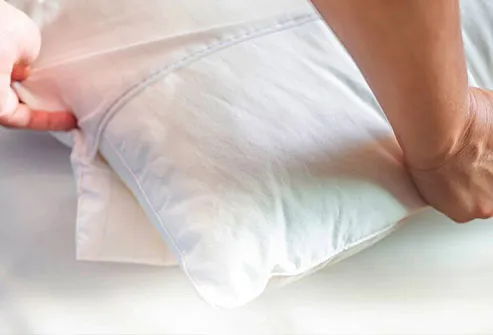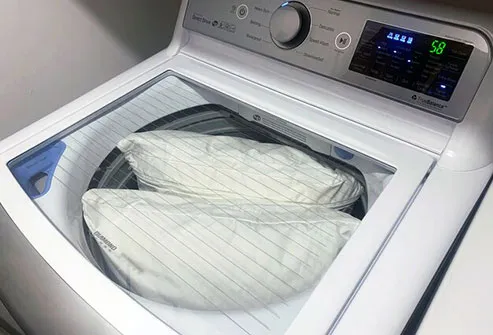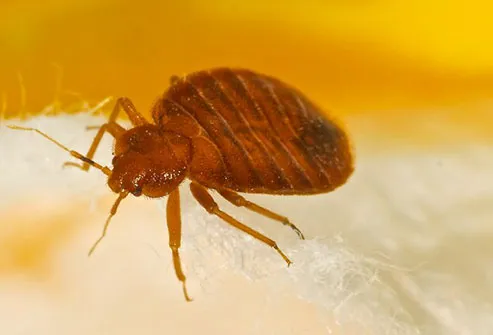Undercover Trouble

You spend a third of your life in bed. So clean bed linens should be one of your must-do chores. Think of the drool, sweat, dandruff, and other "stuff" you leave between the sheets. Ideally, you ought to launder them weekly, or at least every other week. But a recent survey found that Americans tend to be sheet slackers, going 25 days between washes.
Mite-y Gross

You shed 500 million skin cells a day. Many slough off while you roll around in bed. All those dead cells pile up on your sheets in between washings. Tiny dust mites love to feed on the shed cells. The critters and their droppings can trigger allergies, asthma, and cause your itchy eczema to flare. If you're allergic to dust mites, wash bedding every week in hot water.
Pet Peeves

Do you sleep with your fur baby? Rover or kitty’s hair and dander on your bedding become extra buffet fare for dust mites. If your dog has a skin condition called mange also called animal scabies you fortunately can’t catch it from him but your skin can turn itchy and irritated. Your pets also can pass on a fungal infection called ringworm of the scalp. Aim to change your sheets once a week.
Bacterial Bed Buddies

Dead skin cells, sweat, saliva, and more can turn your comfy bed into a petri dish for germs to grow. For instance, lab tests found that swabs from pillowcases unwashed for a week harbored 17,000 times more colonies of bacteria than samples taken from a toilet seat.
Bedroom Breakouts

Is your acne worse and you can't figure out why? Your dirty pillowcase could be to blame. The embedded dirt, dead skin, and bacteria can clog your pores. If you have bad breakouts, change your pillowcases every 2-3 days and the rest of your bedding once a week.
Sickly Sheets

If you or your partner has been ill, toss your sheets into the wash right away to kill any lingering germs. Most bacteria or viruses can survive on soft surfaces for minutes to hours. The duration varies based on the specific microbe. For example, flu viruses live on tissues for just 15 minutes, but some stomach bugs can survive on fabrics for 4 hours.
Pillow Toss

Where you rest your head at night can be full of fungus -- some can be dangerous to those with asthma. If your pillow -- the fluffy thing itself -- can be washed, do so at least twice a year. Follow the care label on how to do it. Make sure to rinse and dry it well to prevent mildew. If you use a pillow protector, toss it into the wash along with your pillowcase.
Sheet Swaps

Some other things can add to the icky factor between your sheets. Strip the bed weekly (or even more often) if you:
- Sleep in the nude
- Snack in bed
- Sleep with your kids
- Sweat a lot at night
Let Your Sheets Breathe

You may have heard that the best way to kick start your day is to make your bed. But it might be wise not to rush. That's because moisture builds in your sheets after each night of slumber. When you wake up, peel back the covers and give your bed a chance to dry. That makes it a less attractive nesting spot for bacteria and mites.
Wash Day Tips

Launder your bedding with the hottest water suggested on the care label. Afterward, toss it into the dryer. Studies show the dryer's heat can kill some germs that survive the wash. If it's safe for the color, use a germ-killer like bleach on your sheets, especially if you're cleaning up after a sick person.
Dirty Duvets and More

Some comforters or duvet covers aren't machine washable. So check labels before you launder. Stick to this cleaning schedule for a fresh bedroom:
- Comforters, blankets, and duvet Covers: Once every 1-2 months. (If you don't use a top sheet, wash them when you do your sheets.)
- Mattress pad: Wash four times a year
- Bed skirt: Every 3-6 months
Bedbugs

These critters aren’t lured by dirty or clean sheets. They’re attracted to you. They live in warm places close to people, so your bed is perfect. Bedbugs crawl out at night and feed on your blood. You may wake up with itchy bite marks. The bugs travel to your home from places that are infested, like a hotel, dorm room, neighbors apartments, schools, workplace on your jackets. In other words--they are almost everywhere! Dry your bedding on high heat for 30 minutes to kill the bugs and their eggs.
Healthy Living: Health Hazards When You Don't Wash Your Sheets
This tool does not provide medical advice. See additional information: 
© 1996-2024 WebMD, LLC. All rights reserved.
Source slideshow on WebMD